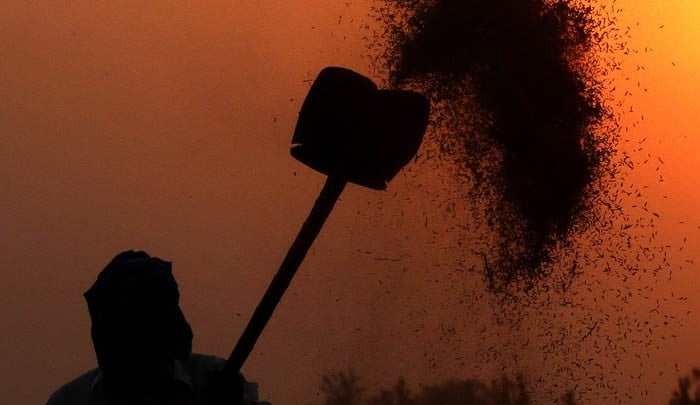

Climate change is badly affecting food crops in Pakistan, triggering fears of food insecurity. Rice, one of the main food crops of Pakistan, has encountered severe climate crisis in the form of unexpected flooding and pest attack. Severe flooding in areas famous for quality rice production i.e. Narowal, Kamoke, Gujranwala, Sialkot and Narang Mandi has badly affected the rice crop.
According to officials of Agriculture Extension Punjab, rice crop on 548,000 acres had been affected by the flooding, out of which 192,000 acres faced a total calamity and the farmers had been compensated by the government. They claim that overall rice production has been increased from what we had last year but they also admit that in case of Basmati rice the production has been reduced remarkably as yield has gone down to 21 maunds per acre as compared to 22 maunds per acre last year and the reason behind is climate crisis.
Flooding ruined a large area and post-flooding effects added further to the crisis. Water ponds after floods combined with the hot weather provided ideal atmosphere for pests to grow, cutting the produce of the crops.
An increase of almost 35 per cent in rice prices has been observed compared to the previous year as it was Rs1600 to 1800 per 40-kg for raw crop and this year it started form Rs2250 per 40-kg and went to as maximum as Rs2800 for the same quantity. Finished product is available for Rs 120/kg in the market whereas it was Rs 80/kg last year.
Muhammad Anas, a rice grower from Gujranwala, says that this year prices have inflated mainly because of crops loss due to extreme weather, heavy rainfall and floods. "This year, we have encountered a viral disease called "Leaf Blast" and a climate disease called "Leaf curl" along with the Hopper attack as flood consequences," he lamented. He also blamed the Agriculture Department for not responding to the problem adequately. "Besides high prices of DAP, shortage of electricity and gas have also played their role in reduced production and increased prices," Anas adds.
Hamid Mallhi, Chairman Rice Growers Association, reveals there is a 30 per cent cut in Basmati rice production due to floods and pest attack in Punjab. Situation in Sindh and other areas is better. "As far as price is concerned, Super Basmati rice is an export commodity and its price is directly linked with demand of international market. Boost in dollar rate means boost in local price as well," he adds.
The damage could have been minimised by proper planning and use of the fuse areas and detention basin. But it has been observed that the fuse areas or detention basin on Ravi banks and the water ways are no more in working condition as they have been encroached upon due to increasing urbanisation.
Lack of planning to counter disasters has resulted in severe food insecurity and poverty. National Disaster Management plans do not include these damaged areas though the senior officials of Climate Change Division are of the view that Disaster Management Authorities are responsible for taking practical steps to deal with the crisis.
"Climate change is there and it is evident now. Farmers are reluctant to adapt to it which is resulting in low yields and crops losses. We are providing the guidelines while the authorities on provincial level are responsible for implementation," says Raja Hassan Abbas, Additional Secretary Climate Change Division. "Ground activity regarding risk reduction is the liability of NDMA and PDMAs."
Punjab Provincial Disaster Risk Management authorities are of the view that they can only provide the data of the damages and concerned departments are responsible to take the precautionary measures.
Experts are of the view that Pakistan needs immediate and comprehensive action to counter the negative impact of climate change on our crop production and food security as research has confirmed that not only rice but overall production is on decline due to changing weather patterns and frequent occurrence of extreme weather events.
At this critical time when we are having the severe damages due to climate change, the government has imposed heavy cuts over the budgets of the Ministry of Climate Change and it has been reduced to a division working under the Cabinet Ministry. It needs a strong political will as well to understand the severity of the crisis as total damages due to climate crisis have reached 5.42 per cent of the GDP which is inevitable and calls for immediate action.